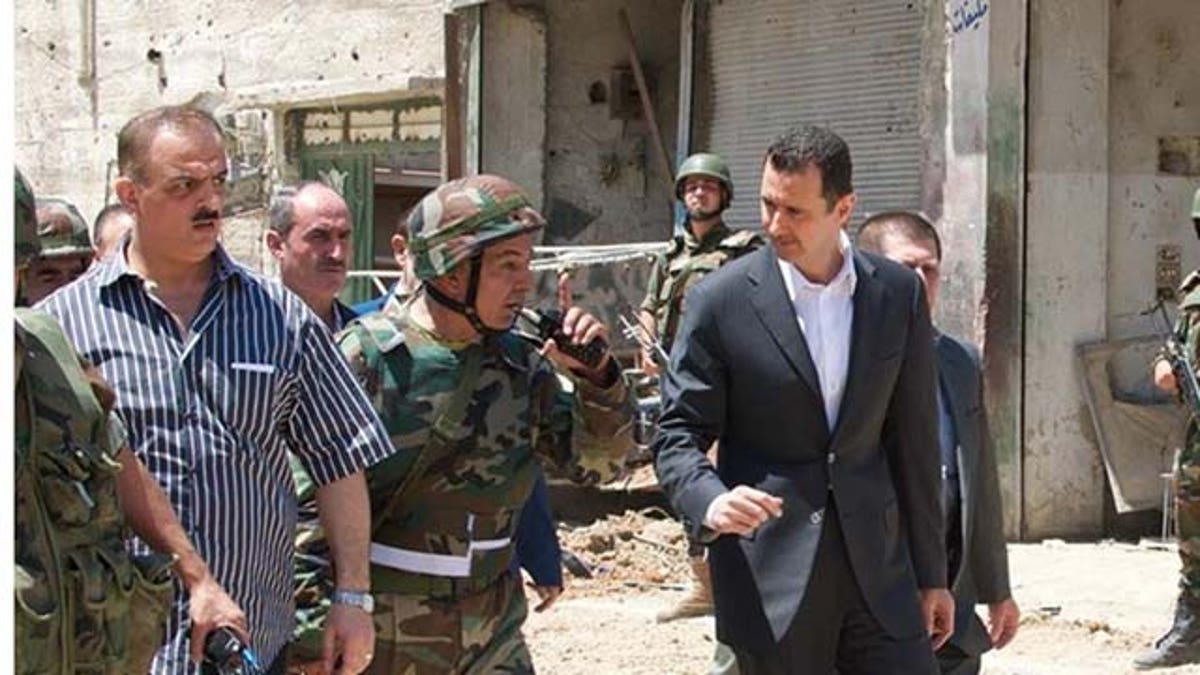
August 1, 2013: This image posted on the official Facebook page of the Syrian Presidency purports to show Syrian President Bashar Assad walking with soldiers with during Syrian Arab Army day in Darya, Syria (AP Photo)
The Syrian government Thursday denied a claim by rebels that President Bashar al-Assad's motorcade was attacked in Damascus.
Syrian rebels said they fired rockets and mortar rounds that hit an upscale district of Damascus where Assad attended prayers to mark the start of a major Muslim holiday in a rare attack in the high security area.
At least two Syrian rebel brigades claimed they hit Assad's motorcade in the Malki district of the capital, but Syrian state TV broadcast images of the Syrian leader attending prayers and the information minister denied reports that the president had been attacked.
However, it was not possible to determine if the footage of Assad praying was filmed before or after the attack.
Sky News reported that a video distributed by the Tahrir al Sham rebels showed smoke rising from what it said was the Malki district, where Mr Assad and his close aides have homes.
Assad has a residence and an office in the upscale district, which has largely been sheltered from the shelling and battles that usually rage in the city's impoverished suburbs. It was not clear if Assad has stayed in Malki in recent months.
This was the Syrian leader's third public appearance in over a week as his regime tries to capitalize on recent gains on the battlefield against rebels fighting to oust him from power.
Information Minister Omran al-Zoubi dismissed the attack claims as "rumors" and told state TV that Assad drove his own car to the Anas bin Malik Mosque, located in the heart of Malki.
In the state TV broadcast, Assad, dressed in a suit, was seen praying alongside Syria's grand mufti at the start of Eid al-Fitr, the three-day holiday that ends the holy month of Ramadan. The Eid prayers are typically an hour or two after sunrise. In previous years, Assad has been seen attending them early in the morning.
The Britain-based Observatory for Human Rights, which closely monitors the fighting in Syria, said only three mortar shells hit Malki early in the morning. The neighborhood has rarely been targeted by opposition forces during the conflict that only last year saw the rebels bring their battle to the heart of the capital.
There were no immediate reports of casualties or damage in the shelling, which was confirmed by Malki residents, who spoke on condition of anonymity fearing for their own safety.
Rami Abdul-Rahman, the Observatory's head, said he had no confirmation that Assad's motorcade had been hit and was skeptical of the reports.
An Islamic rebel brigade, Liwaa Tahrir al-Sham, said it fired several 120 mm shells in the direction of Assad's motorcade after carrying out careful surveillance of its route.
The claim was made on the group's Facebook and Twitter pages and could not be independently confirmed. The brigade's head, Firas al-Bitar, told Al-Arabiya TV that the motorcade had been hit but that it was not certain whether Assad himself had been harmed.
Capt. Islam Alloush of the Liwa al-Islam, another rebel brigade, also claimed responsibility, saying there were casualties among Assad's entourage. He said they carried out the attack separately and without coordinating with Tahrir al-Sham brigade.
Alloush told The Associated Press that Assad was not hit but claimed several people within his entourage were killed or wounded. He claimed the footage aired on Syrian TV showing Assad praying at the mosque may have been pre-recorded or fabricated.
"We had promised the Syrian people a big operation for Eid and we have delivered," he said.
There was no way to verify the authenticity of the claims. Rebels have claimed attacks against Assad or members of his government in the past that turned out to be false.
Syria's state news agency said several mortar shells also hit the capital's suburb that is home to the golden-domed Shiite shrine of Sayeda Zeinab, killing five people and injuring 12 others. The shrine, located just a few kilometers (miles) southeast of Damascus is named after the Prophet Muhammad's granddaughter. The shrine is popular with Iranian worshippers and tourists.
Meanwhile, the leader of Syria's exiled opposition coalition attended holiday prayers in the southern province of Daraa on Thursday, his second trip inside the country since he was elected head of the Western-backed Syrian National Coalition last month.
The coalition's spokeswoman, Sarah Karkour confirmed the rare foray into Syria by the opposition leader Ahmad al-Jarba, but did not say in which mosque in Daraa he prayed. In a video, posted on the Internet by the coalition, al-Jarba, dressed in a suit, is seen talking to people, surrounded by unarmed rebels wearing fatigues.
Syrian uprising started in Daraa in March 2011 as protests against Assad rule. The largely peaceful revolt turned into a civil war after opposition supporters took up arms to fight a brutal government crackdown. More than 100,000 people have been killed in the violence in the conflict.
Assad's troops have recently been on the offensive in central Syria, making advances near the border with Lebanon and in the city of Homs, an opposition stronghold and Syria's third largest city. They've also been fighting pockets of resistance around the capital, Damascus, to fortify the seat of Assad's power there, and fought rebels in Daraa to the south, near the border with Jordan.
On Wednesday, Syrian government troops ambushed a large group of rebels trudging through a desert road northeast of Damascus, killing more than 60 fighters.
In the north, where much of the territory has been under opposition control in the past year, rebels scored a rare victory earlier this week when they captured a major air base in the Aleppo province near the border with Turkey.
Syria's crisis started as a largely peaceful uprising against Assad's rule in March 2011
The Associated Press contributed to this report








































